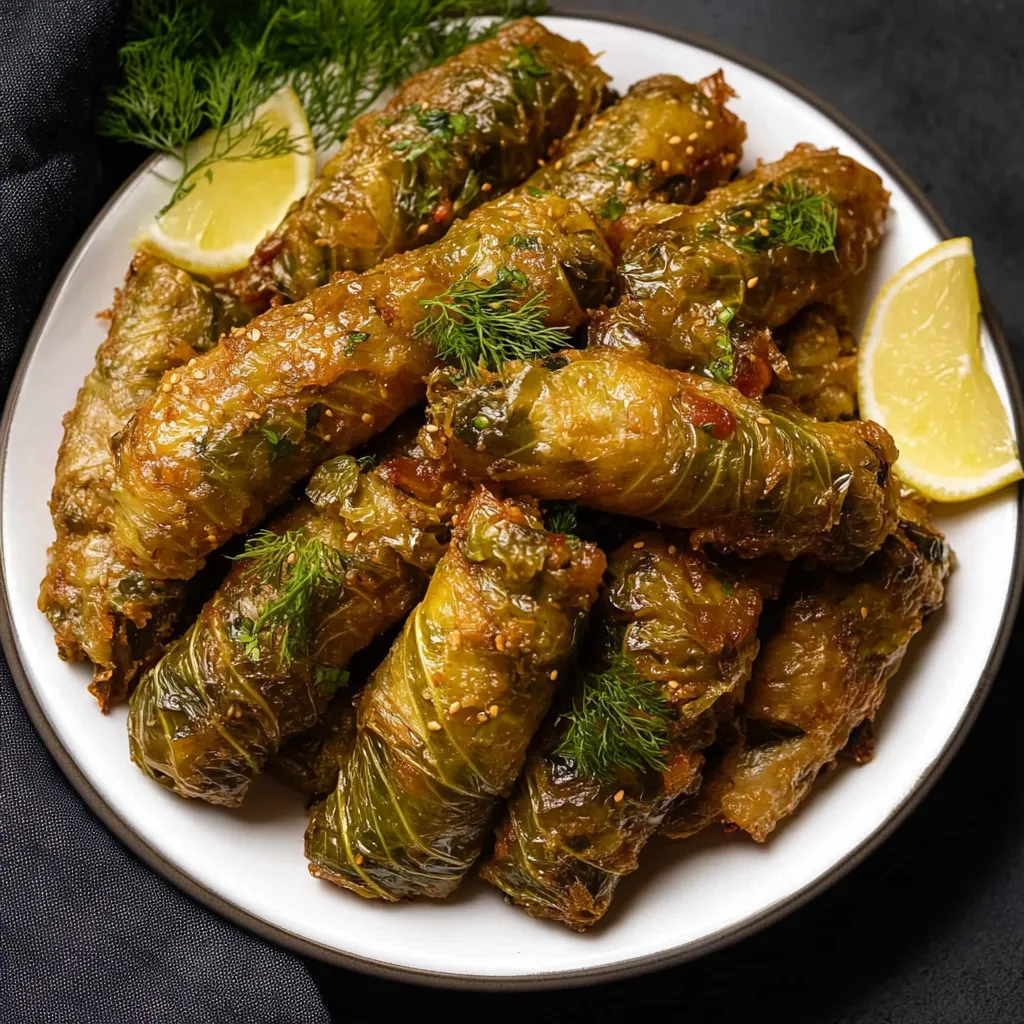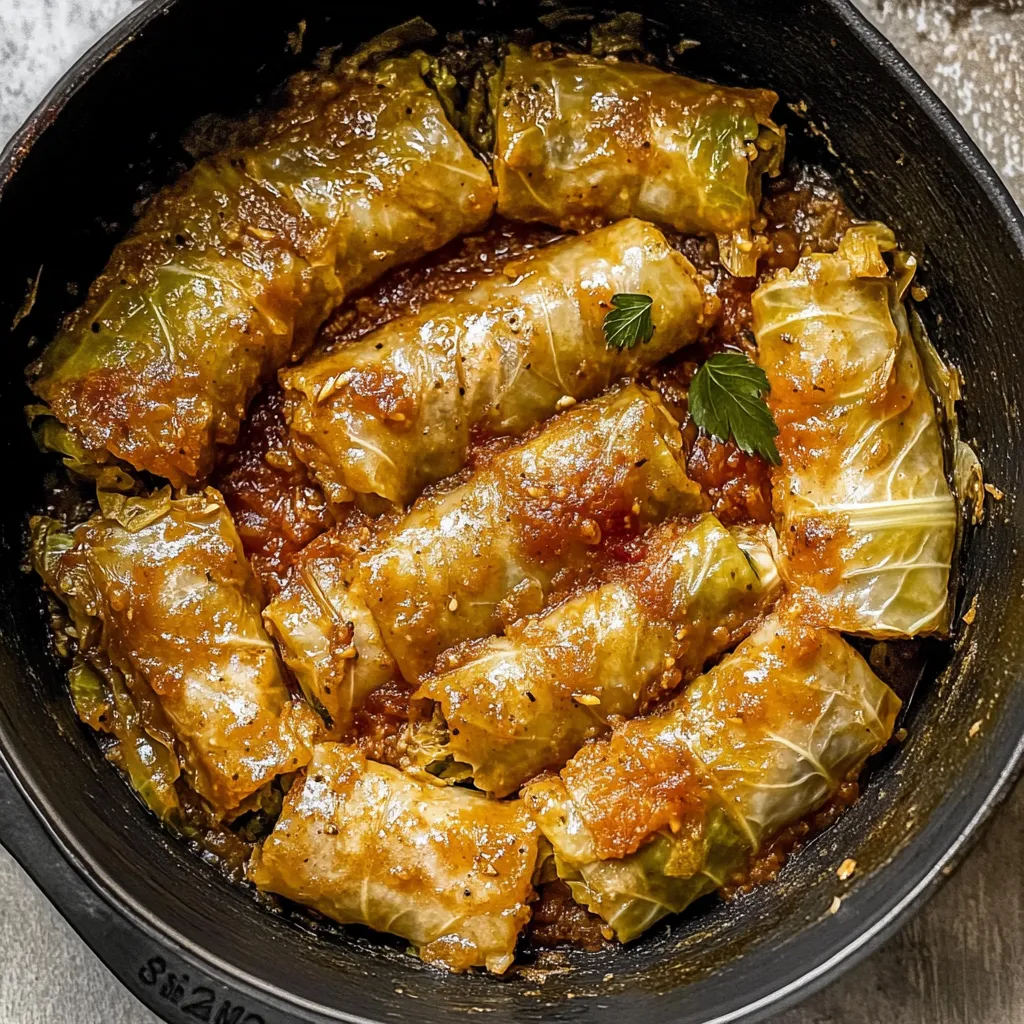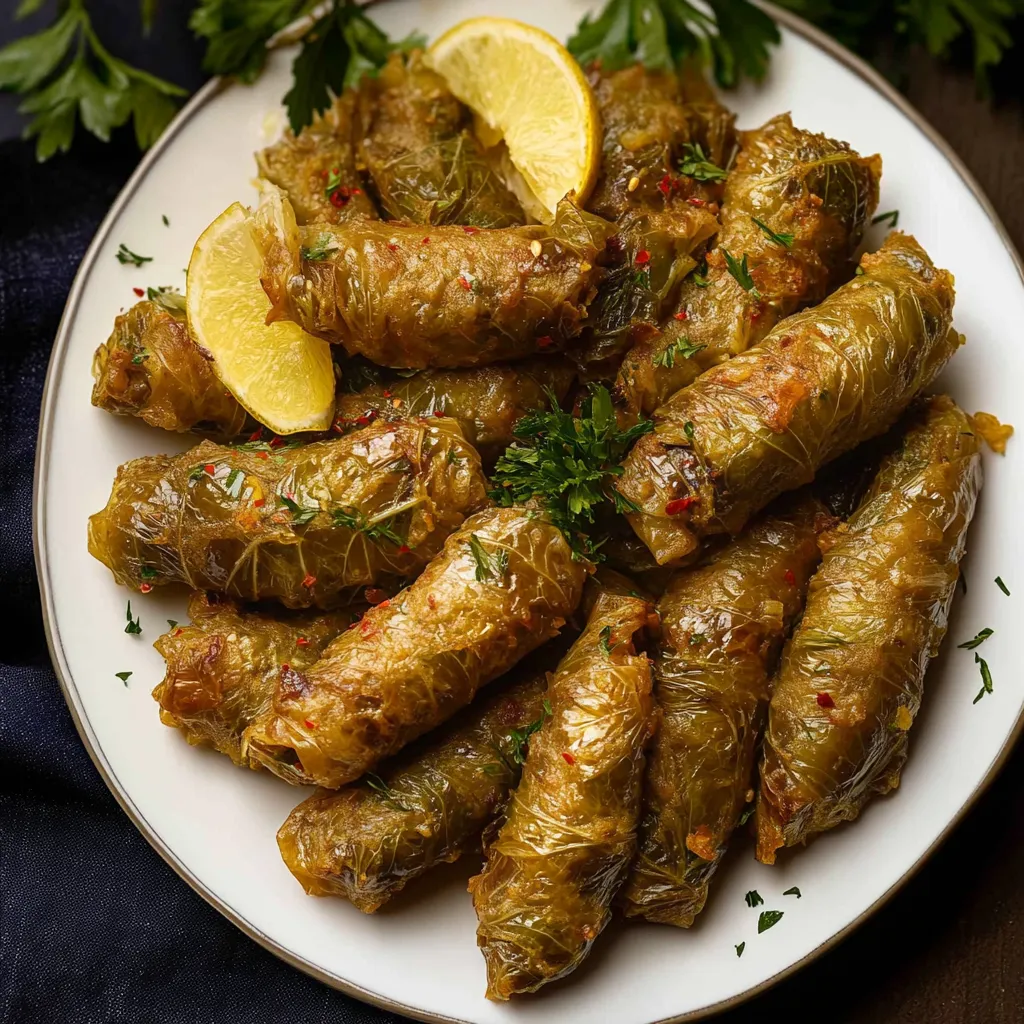 Pin it
Pin it
This traditional Turkish cabbage roll recipe transforms simple ingredients into an extraordinarily flavorful meal that will transport you straight to the vibrant streets of Istanbul. The delicate cabbage leaves wrapped around a savory rice filling create perfect little bundles of joy that always disappear quickly at my family gatherings.
I discovered this recipe during my travels through Turkey's coastal villages where I watched local grandmothers prepare these rolls with such care and precision. Their generations of wisdom shine through in every bite, and now this dish has become my go-to comfort food whenever I want to recreate that magical experience.
Ingredients
- Cabbage: One large head. Choose one with pliable outer leaves and a solid, heavy feel
- Rice: Two cups uncooked. Long grain works best as it stays fluffy within the rolls
- Onion: One large, finely chopped. The aromatic foundation that infuses the filling
- Garlic: Four cloves, finely chopped. Fresh provides the best flavor profile
- Tomatoes: Two to three, finely chopped. Look for ripe but firm ones for proper moisture
- Tomato paste: Two tablespoons. Adds concentrated umami depth to the filling
- Fresh herbs: Parsley and dill. They bring brightness and distinctive Turkish character
- Dried mint: One tablespoon. The secret ingredient that makes these truly authentic
- Spices: Black pepper, paprika, sumac. Choose high quality for maximum impact
- Olive oil: Quarter cup. Extra virgin preferred for its fruity notes
- Lemon juice: From half a lemon. Always use fresh for vibrant acidity
Step-by-Step Instructions
- Prepare the filling:
- Combine all filling ingredients in a large mixing bowl until thoroughly incorporated. The rice should be raw as it will cook inside the cabbage leaves. The mixture should taste slightly more seasoned than you might expect since the cabbage will mellow the flavors during cooking. Take a small taste and adjust salt and lemon to your preference before filling.
- Blanch the cabbage:
- Remove the tough core from the cabbage by cutting deeply around it in a cone shape. Carefully peel away whole leaves, working from the outside in. Bring a large pot of water to a rolling boil, then submerge cabbage leaves in batches for 2 to 3 minutes until they become pliable but not mushy. Immediately transfer to a colander with a slotted spoon and allow excess water to drain completely.
- Prepare the leaves:
- Lay each blanched leaf flat on your work surface and identify the thick central vein. Using a sharp knife, carefully slice along both sides of this vein to remove it, creating a more flexible leaf. Save these removed pieces for the bottom of your cooking pot. If leaves are especially large, cut them in half crosswise to make more manageable pieces for rolling.
- Form the cabbage rolls:
- Place approximately one tablespoon of filling near the stem end of each prepared cabbage leaf. Fold the bottom of the leaf over the filling, then fold in the sides and roll forward to create a neat package. The roll should be secure but not too tight, as the rice will expand during cooking. Place each completed roll seam side down in your cooking pot.
- Create the cooking base:
- Line the bottom of a heavy pot with the reserved cabbage veins and any torn or unusable leaves. This creates a protective layer that prevents the bottom layer of rolls from scorching and adds flavor to the cooking liquid. Arrange your cabbage rolls in neat, tight rows above this layer.
- Prepare the cooking sauce:
- In a separate saucepan, gently heat olive oil, then add tomato paste, garlic, dried mint and paprika. Stir constantly for about 30 seconds until fragrant but not browned. Pour in hot water and bring just to a boil to integrate flavors. This deeply seasoned cooking liquid will infuse into your cabbage rolls as they simmer.
- Cook to perfection:
- Pour the prepared sauce evenly over your arranged cabbage rolls. Place an inverted plate directly on top of the rolls to keep them submerged and prevent unraveling. Bring to a gentle boil over medium heat for 5 minutes, then reduce to the lowest possible simmer. Cover the pot and cook for 40 to 45 minutes until the rice is tender when tested.
 Pin it
Pin it
The dried mint in this recipe completely transforms the flavor profile from what many Western palates might expect from cabbage rolls. My Turkish friend Ayşe taught me that quality dried mint is the soul of this dish, explaining that her grandmother would dry homegrown mint each summer specifically for winter batches of lahana sarma.
Make Ahead Tips
These cabbage rolls actually improve with time as the flavors meld together. You can prepare them completely up to two days before serving. Simply reheat gently on the stovetop with a splash of water or broth to prevent sticking. The texture becomes even more harmonious after resting, making this an ideal dish for entertaining when you want to minimize day of cooking.
Serving Suggestions
In Turkey, these cabbage rolls are often enjoyed with a dollop of thick yogurt on top. The cool creaminess provides a perfect contrast to the warm, aromatic rolls. A simple side salad dressed with olive oil and lemon completes the meal. For a more substantial spread, serve alongside bulgur pilaf or crusty bread to soak up the delicious sauce.
Regional Variations
Throughout Turkey, you'll find fascinating regional adaptations of this dish. In the Black Sea region, a touch of molasses might be added to the sauce for subtle sweetness. Along the Mediterranean coast, pine nuts and currants often find their way into the filling. Some families add ground lamb to the rice mixture for special occasions, while others maintain strictly vegetarian traditions.
 Pin it
Pin it
Every time I prepare this dish, it brings back memories of Turkish hospitality and the warm smiles of the locals I met. The perfectly balanced flavors never fail to impress.
Frequently Asked Questions
- → Can I prepare Lahana Sarma ahead of time?
Yes, you can prepare Lahana Sarma a day in advance. Assemble the rolls and store them covered in the refrigerator. Cook them the next day. They actually taste even better after the flavors have had time to meld together.
- → What can I serve with Turkish cabbage rolls?
Turkish cabbage rolls pair wonderfully with yogurt, a squeeze of fresh lemon juice, crusty bread, or a simple green salad. For a complete meal, serve them alongside bulgur pilaf or roasted vegetables.
- → Can I freeze leftover cabbage rolls?
Yes, Lahana Sarma freezes well. Allow them to cool completely, then transfer to airtight containers or freezer bags. They can be stored frozen for up to 3 months. Thaw overnight in the refrigerator and reheat gently on the stovetop or in the microwave.
- → What if my cabbage leaves tear while blanching?
Don't worry if some leaves tear during blanching. You can overlap smaller or torn pieces when rolling. The most important thing is to create a secure package for the filling. Small tears won't affect the flavor, and the rolls will still hold together during cooking.
- → Can I use brown rice instead of white rice?
Yes, you can substitute brown rice, but it will need to be parboiled first since it requires longer cooking time than white rice. Cook it for about 15-20 minutes until partially tender before using it in the filling. The final cooking time for the rolls may also need to be extended slightly.
- → What makes Turkish cabbage rolls different from other versions?
Turkish Lahana Sarma is distinctive for its aromatic herb blend, particularly the use of mint, dill, and sumac, which gives it a uniquely Middle Eastern flavor profile. Unlike some Eastern European versions that use meat, traditional Turkish cabbage rolls often feature a vegetarian rice filling with an emphasis on fresh herbs and spices.
